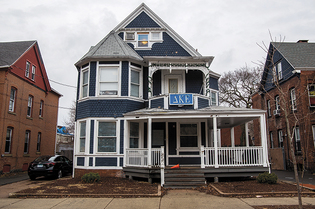 loading
loading
Light & VerityYale report slams DKE cultureThe dean offers "some plain advice about events like these: don’t go to them."  Lucas Holter ’21Until recently, Delta Kappa Epsilon operated out of this house on Lake Place and the one next door. In January, the fraternity was criticized in a university report for out-of-control parties. View full imageIn a message to undergraduates on the first day of the spring semester, Yale College dean Marvin Chun did not mince words about parties at the fraternity Delta Kappa Epsilon. He offered “some plain advice about events like these: don’t go to them.” Chun was reporting on an 11-month Yale investigation into “allegations of a sexually hostile climate” at DKE, announced last February after the Yale Daily News and Business Insider published allegations of as many as ten incidents of sexual misconduct by DKE members. The investigation, led by assistant provost and Title IX coordinator Jason Killheffer, did not address specific instances of alleged misconduct, which are handled through other channels. Instead, Killheffer interviewed students and groups to get their perspectives about DKE and the broader campus social culture. Students described DKE parties as extreme even by fraternity standards, with unlimited alcohol, little crowd control, and a lack of concern among the members for guests’ well-being. “I condemn the culture described in these accounts,” Chun wrote in his message. “It runs counter to our community’s values of making everyone feel welcome, respected, and safe.” In 2010, DKE pledges were heard on Old Campus shouting violent chants, including “No means yes, yes means anal.” Although Yale would not say if and how individual members were punished, it barred DKE from recruiting on campus or communicating with its members via university e-mail for five years. That punishment demonstrates the limited options available to Yale officials, who have authority over individual students, but not over the off-campus frats, which are not official student organizations. Measures to increase the safety of parties, including training for bartenders, party hosts, and bystanders, are offered by the university but cannot be required. Students in Killheffer’s report talked about the centrality of fraternity parties in Yale’s social culture. This is in part a result of the raising of the drinking age in the 1980s, which made on-campus parties with alcohol hard to regulate. Still, some students in Killheffer’s report said they’d like to see more alternative, co-ed social spaces on campus. In an e-mail to the Yale Alumni Magazine, Chun cited events like Spring Fling and the fall Bulldog Bash, which he says have been successful “even with restricted access to alcohol, which in my own experience is less of a big deal than it may have been in the past. More than anything, students want a place to be together and socialize, and I’m working to make more opportunities for them to do that next year. The Schwarzman Center will be perfect for that when it opens, both because of the location and the quality of the venue.” As for DKE, the fraternity issued its own report last February detailing measures it would take to foster “a safer and more welcoming environment,” including tightening control of alcohol, cleaning up their house, appointing members to abstain from drinking and be “sober monitors” during parties, and disciplining members more strictly. (DKE representatives did not respond to our request for an interview.) But at least some of those issues are moot for the time being: the fraternity’s two houses on Lake Place were recently sold, and the new owner will not rent to the fraternity. It’s not clear whether the fraternity will have a house in the future.
The comment period has expired.
|
|